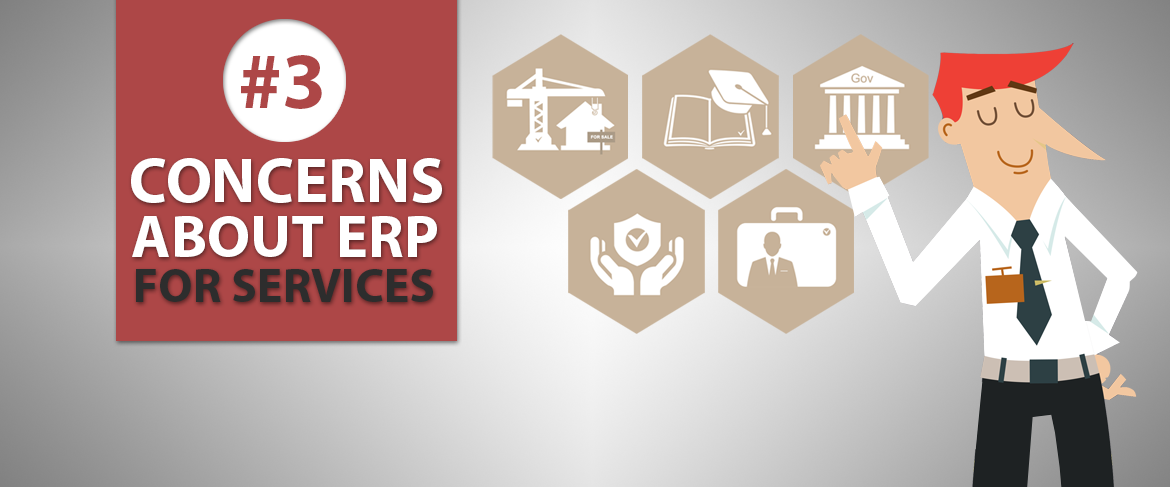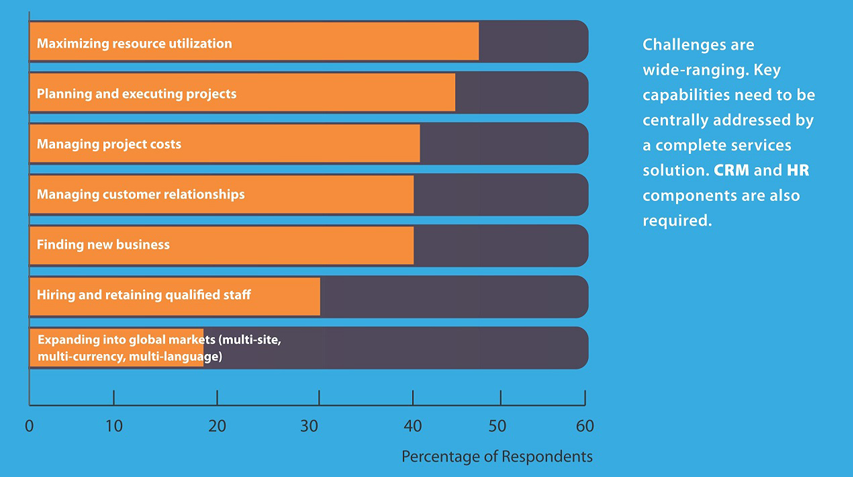
The importance of an ERP for services is often underestimated besides the fact that more than three out of four jobs (77.2%) in the U.S. economy are in the service sector. According to the department of professional employees, by 2018, this dominance is expected to increase, with 78.8% of total employment being in the service sector.
Service oriented businesses often make one big mistake! They choose manufacturing ERP solution to solve their service-oriented needs. The logical explanation for this error is because historically, ERP systems were built to serve companies that designed and manufactured products. But services industries by nature are project and customer oriented and they have a different set of ERP needs. Buyers’ top priorities for ERP software in the services industries include project planning and execution, resource utilization, efficient management of project costs, as well as strong customer relationship module.
7 Needs from an ERP for Services solution
According to the latest survey conducted by TEC, this are the top 7 needs expected from a robust ERP for services solution:

When choosing an ERP for services oriented business, around 50% of all respondents agree that the new ERP solution should help them maximize the resource utilization. Also the ERP for services should include strong project management module that will provide: planning and execution of projects (around 45% of all respondents) as well as managing project costs (more than 40% of the respondents). The need of a strong customer relationship system and tool for finding new clients has been stated by 40% of all respondents.
Furthermore, the management of the workforce is also another important issue when choosing an ERP for services. Around 30% of the respondents stated the need of a proper tool for hiring and retaining qualified staff inbuilt in the ERP for services. The “multi-” functionality feature (multi-size, multi-currency, multi-language) is important for a bit less than 20% of all respondents. This is expected because most of the service oriented organizations are small and mid-sized and still not ready for expanding into global markets.
Big Initiatives
Nearly 50% of all respondents in the survey are pursuing either a replacement or an upgrade to their entire ERP system. Other initiatives include: time and expense management (32%) and customer relationship management (29%).
Problem Areas
According to the same survey, ERP solution vendors still have a long way to go toward meeting the expectations of the user community. From all respondents:
- 37% reported issues with the user experience, expecting improvements in this area from the current or the new ERP for services solution.
- 36% reported experiencing system flexibility difficulties. Their current ERP system was too rigid and not able to support users changing needs.
- 27% reported experiencing scalability issues. The system was not able to support their growth over time.
- Only 26% reported that their current ERP for services solution provide mobile device support.
- 28% reported problems with efficient implementation and maintenance of the project costs.

VIENNA Advantage Professional Services Industry Template covers the needs of wide range of service oriented companies starting from: Construction and Real Estate to Higher Education, Professional Services, Consulting, IT, Government, Public Services, Non-profit organizations, Legal Services, Contracting and much more.
The core of this template is VIENNA Advantage ERP/CRM software that comprises of inbuilt Project Management module, Time and Expense Management module, CRM system, Service Contract Management and Contract Renewal module, Resource Management and Optimization module, Financial Management module, as well as HR and Payroll module. Moreover, there is an option for including enterprise level Document Management System.
Our ERP for services is web and cloud based software accessible from any mobile device anywhere!
Continue reading. We choose this 3 articles for you.
11 Steps to successful Project Management
